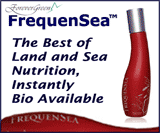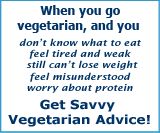
|
Free SV Reports!Testimonials"I gotta say again how much I love your website. It makes this new path so much easier and fun..." "Wow, thank you so much for your input, it was very thorough and more than I expected. You rock! :)" "I see you are passionate about this, that is why I know I came to the right person for advice." "Thanks for the great advice Judy! You're a life-saver!" "Thank you for the reports and encouragement ...all very much appreciated!" "I saw lots of vegetarian sites, and yours was one of the best." |
Vegetarian Advice: Milk, Beef, Omega 3'sQuestion: Vegetarian research, can't find answers about milk, animal cruelty, beef products and Omega 3'sI have been researching vegetarianism, and had questions about milk, animal cruelty, beef products and Omega 3's, that I can't seem to find the answer to - J.R. 1) I keep reading things about soy milk and other milk alternatives. It was my understanding that not drinking milk would fall under Veganism. Is there something in the process of getting milk that hurts/kills a cow (animal cruelty)? 2) Growing up, I had a friend who was vegetarian, and once I offered her some sort of mass produced baked good product (think Hostess). She looked at the wrapper and said that she couldn't eat it because there was a beef product in it. When I looked at the wrapper I did not see it anywhere and she mentioned that it was called something else - a name I can't remember. Are there things like that nowadays (this was about 8 years ago) that I should be checking for on labels, or do companies spell things out better? 3) When I mention going vegetarian to others, I am warned continuously about getting enough Omega-3 for my brain and that this is strictly in fish oil. Is there another source for this? Savvy Vegetarian AdviceDear J.R., Milk Production and Animal Cruelty: In conventional dairies, and even in some organic dairies, cows lead very short, unhealthy, and stressful lives (3 - 4 years, instead of their normal life span of 20 years - a few years longer in organic dairies), and end up in the slaughter house. In conventional dairies, they don't have access to pasture. They are milked at least three times a day. They live in small stalls, with constant lights and noise (the milking machines are tremendously loud). They are pumped full of drugs to boost milk production - they are considered milk producing machines. Their calves become veal, usually, unless they're female. The normal cow life cycles are completely disregarded. Organic dairies usually treat the cows more humanely, but they're still considered production units, not family pets (with some exceptions). If you want to drink milk, buy organic, reduce your consumption, and remember, drinking a bit of cows milk is a big improvement over eating the cow, so don't feel you have to evolve to full fledged vegan overnight. Beef Products in Packaged Food: It could have been gelatin, stearic acid, or glycerin. All are used as binders, and have various trade names. It could have been lard, or margarine. Beef by products are found in many consumer products - here's a list. It's always a good idea to read labels - ingredients like that are usually listed. But labelling requirements are getting looser, not stricter. It's safe to assume that there could be nasties in processed foods that aren't mentioned on the labels. Vegetarian Sources of Omega 3's: Yes, there are vegetarian sources of Omega 3's! It's just another anti-vegetarian myth, that there aren't. Flax oil and ground flax seeds are a good source of Omega 3's, as well as walnuts. There is a small amount of Omega 3's in avocados and olive oil. It's important to have some of those foods everyday - most people, including non-vegetarians, don't get nearly enough Omega 3's in their diets, even though you don't need much. It's easy to incorporate flax oil in salad dressings, mix it with steamed veggies or cereal - it shouldn't be cooked. Ground flax seeds can be used in cooked cereals, or in baked goods (it's also an egg replacer). Walnuts are good in salads, or as a snack (nice with raisins and sunflower seeds, or in baked goods or cereal. Make sure they're fresh, not rancid. Keep all shelled nuts and oils in the fridge. Good questions! Thanks for writing - Judy Kingsbury, Savvy Vegetarian More SV Advice on Going Vegetarian or VeganArmy Man Wants to Go Vegetarian In Iraq Vegetarian Lifestyle, Body For Life Weight Training Choosing Between Vegan and Vegetarian Lifestyle How To Maintain Vegetarian Lifestyle on Tight Budget How To Start A Proper Healthy Vegetarian Diet Stay Fit and Healthy on a Vegetarian Diet Student Afraid To Go Vegetarian at College and Starve Send a note, recipe, link, resource, etc. to Savvy Vegetarian Savvy Veg Privacy Policy, Health Disclaimer, Publishing Policy |
What's New?Veg RecipesVeg Blogs:Veg Advice:Veg Articles: |


